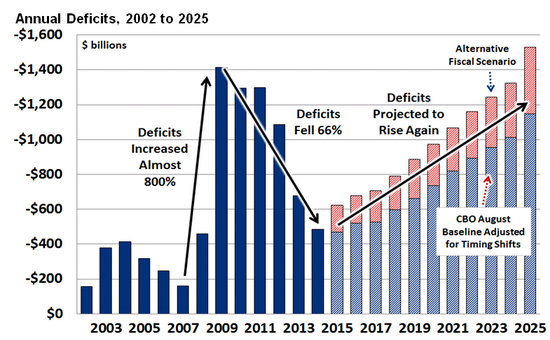Obama Brags About His Deficit Reduction, But As a Senator, He Would Have Been a Critic
The deficit is down, way down, coming in at $486 billion this year, in the range of 3 percent of GDP. Over the last year, the White House has not been shy about advertising the deficit's decline. The deficit has been "cut in half since 2009," the administration's top budget official declared last year. It's "falling faster than any time since the end of World War II," the White House explained with a handy shareable chart. Tell your friends! Or just let Obama explain it himself.
"When I took office," President Obama bragged last week, "the deficit was nearly 10 percent of our economy. Today, it's approaching 3 percent."
All true. And yet it's worth putting the declining deficit in context, and remembering that, as a Senator, Obama probably would have been appalled by his current deficits.
The year's deficit total, just shy of half a trillion dollars, represents a big drop from the $1.4 trillion peak it hit in Obama's first term. (More than 40 percent of that reduction came as a result of tax hikes.) But the reduction only came following a massive 800 percent increase in annual deficits.
Notably, it's still much higher than the typical deficits during the Bush years, which, you may recall, were worrisomely large—indeed, they were large enough that Obama, as a Senator in 2005, declared that "you don't have to be a deficit hawk to be disturbed by the growing gap between revenues and expenses." Between the 2006 and 2007 fiscal years, the deficit dropped from $248 billion to $160 billion.
The Bush-era deficit totals, far lower than his own second-term deficits, were "a sign that the U.S. government can't pay its own bills. It is a sign that we now depend on ongoing financial assistance from foreign countries to finance our government's reckless fiscal policies." Obama even opposed an increase in the nation's debt limit.
But look where we are now: Not only are this year's lowered deficits still much higher than the deficits he was worried about during his predecessor's presidency, they are on track to skyrocket again, as this graph from the Committee for a Responsible Federal Budget shows:

As the CRFB dryly notes, "Unfortunately, the recent fall in deficits is not a sign of fiscal sustainability."
And, of course, a temporarily reduced deficit—which measures the yearly gap between spending and revenues—doesn't mean a reduction in total debt. That's set to rise too. As the Congressional Budget Office noted in August, "The persistent and growing deficits that CBO projects would result in increasing amounts of federal debt held by the public." The fiscal situation is not as obviously and immediately terrible as it was during Obama's first term, but it's hardly anything to brag about.


Show Comments (93)